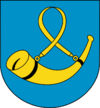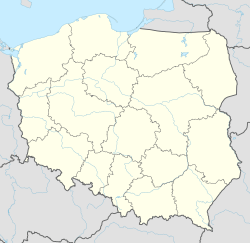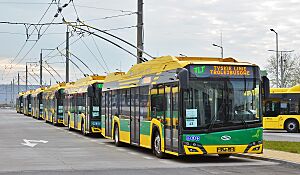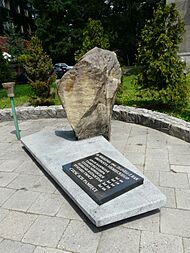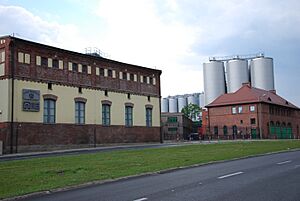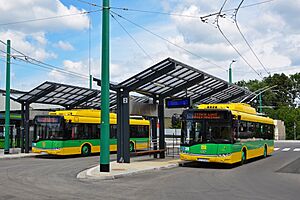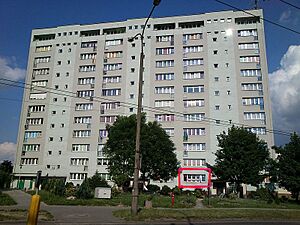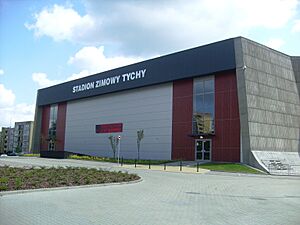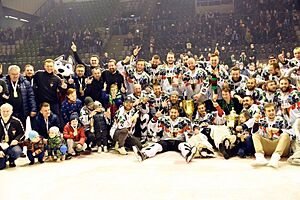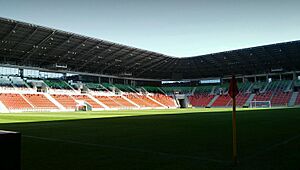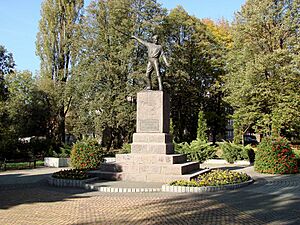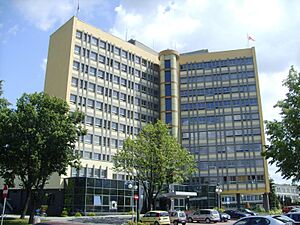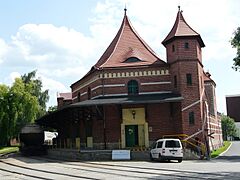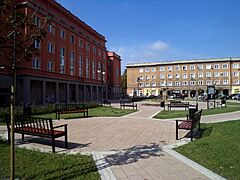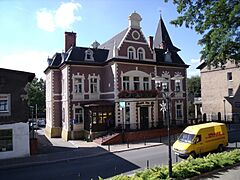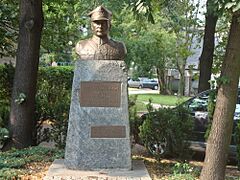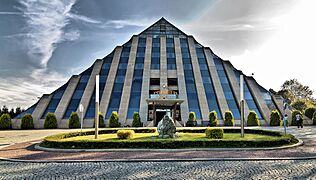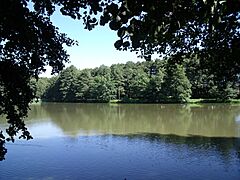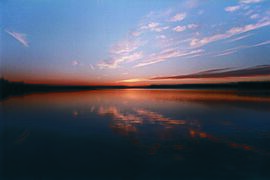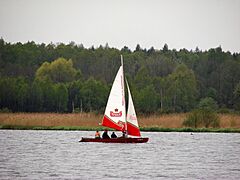Tychy facts for kids
Quick facts for kids
Tychy
|
|||
|---|---|---|---|
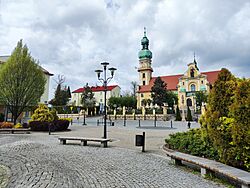
Mary Magdalene Church
|
|||
|
|||
| Motto(s):
Tychy - a good place
|
|||
| Country | |||
| Voivodeship | |||
| County | city county | ||
| First mentioned | 1467 | ||
| City rights | 1951 | ||
| Area | |||
| • Total | 81.64 km2 (31.52 sq mi) | ||
| Population
(31 December 2021)
|
|||
| • Total | 125,781 |
||
| • Density | 1,560/km2 (4,000/sq mi) | ||
| Time zone | UTC+1 (CET) | ||
| • Summer (DST) | UTC+2 (CEST) | ||
| Postal code |
43-100 to 43-135
|
||
| Area code | +48 32 | ||
| Car plates | ST | ||
| Website | https://umtychy.pl/ | ||
Tychy is a city in southern Poland, located about 20 kilometers (12 miles) south of Katowice. It is part of the Silesia region, which is known for its industrial areas. The city borders Katowice to the north and has the Gostynia River, a branch of the Vistula River, flowing through it.
Since 1999, Tychy has been part of the Silesian Voivodeship, a large province with many towns and cities. Tychy is also one of the cities that started the Metropolitan Association of Upper Silesia. This group works to bring the most populated areas of Silesia together for economic and political reasons.
Tychy is very famous for its brewing industry. The well-known Tyskie brand of beer has been made here since the 1600s. Since 1950, Tychy has grown quickly. This growth happened because of plans after World War II to spread out the population in the industrial Upper Silesia region.
Contents
History of Tychy
What's in a Name?
The name Tychy comes from the Polish word cichy, which means "quiet" or "still." For most of its history, this name fit the town well. However, it's a bit funny now, considering how much the city has grown since 1950.
Early Days and Growth
Tychy started as a small farming village. It was located on an old trade route between Oświęcim and Mikołów. The first time Tychy was written about was in 1467. In 1629, the Książęcy Brewery began operating here. Today, it is one of the biggest breweries in Poland.
From 1526, the area where Tychy is located was part of the Austrian Habsburg monarchy. In 1742, Prussia took control of the land after winning a war against Austria. Later, in 1871, the area became part of the German Empire. After World War I, Tychy was briefly part of the new Weimar Republic (Germany) before rejoining Poland in 1921. This happened after local people voted, with 84% choosing to join Poland.
After becoming part of Poland again, Tychy started to develop. It gained a hospital, a fire station, a post office, a school, and other useful buildings. Its population also grew, reaching 11,000 people before World War II.
Tychy During World War II
During World War II, Tychy was taken over by Nazi Germany forces after they invaded Poland. Many people living there were forced to change their nationality or were harmed. In September 1939, some Polish residents were killed. The youngest identified person was 16 years old.
The Germans also set up a forced labor camp for Poles in the city. Another camp for prisoners of war was in the Czułów district. On September 22, 1944, five members of the Polish resistance movement were killed in a public execution. Tychy itself did not suffer much damage during the invasion. This was because most of the fighting happened in nearby areas. In 1945, thousands of prisoners from the Auschwitz concentration camp were forced to march through Tychy towards Gliwice.
Tychy was freed on January 28, 1945.
The "New City" of Tychy
In 1950, the Polish government decided to build a "New City" in Tychy. It was planned to be close to Katowice. Tychy became a city with its own rights in 1951. It is the largest of the "new towns" built in Poland between 1950 and 1985. These new towns helped with urban growth in the Upper Silesian industrial region.
In the 1950s, the Osiedle A neighborhood was built. Later, other neighborhoods were designed by Kazimierz Wejchert and Hanna Adamczewska-Wejchert. Many factories and businesses were created in the 1950s, 60s, and 70s. The city's boundaries grew in 1951 and 1973, adding new districts like Paprocany and Wilkowyje. By 2006, Tychy's population had reached 132,500 people.
In 1999, Tychy became a city with the status of a powiat (city county).
The Tyskie Brewing Museum opened in 2004, and the Municipal Museum opened in 2005.
Tychy Districts
Tychy is divided into 17 districts, called dzielnicas:
- Cielmice (south)
- Czułów (north)
- Glinka, Tychy (west)
- Jaroszowice (north-east)
- Mąkołowiec (north-west)
- Paprocany (south)
- Radziejówka (north-west)
- Śródmieście (city centre)
- Stare Tychy (centre)
- Suble
- Urbanowice, Tychy (east)
- Wartogłowiec (north)
- Wilkowyje (north-west)
- Wygorzele (north)
- Zawiść (north-east)
- Zwierzyniec (north)
- Żwaków (west)
Industry in Tychy
Tychy is an important center for car manufacturing. The global car company Stellantis has a large presence here. The first car factory was opened in 1975. It was later fully bought by the Italian company Fiat in 1992. In 2008, this factory made almost half a million cars. It produces the new Fiat 500 and the Lancia Ypsilon.
There is also a factory in Tychy that makes engines for Opel cars. This plant started in 1996. In 2017, Groupe PSA took over GM's operations in Europe. In 2021, both the former Fiat and Opel plants became part of Stellantis.
As mentioned, the famous Tyskie beer is made in Tychy. It is produced by Kompania Piwowarska, which is part of the international brewing company Asahi Breweries. Tyskie is one of the best-selling beers in Poland.
Transport in Tychy
Tychy has one of only three remaining trolleybus systems in Poland. Trolleybuses are like electric buses that get power from overhead wires.
Major Roads
- Expressway S1
- National road 1
- National road 44
- National road 86
Culture and Arts
Art Galleries and Museums
- Muzeum Miniaturowej Sztuki Profesjonalnej Henryk Jan Dominiak in Tychy
Sports in Tychy
Tychy is home to two main sports teams, both called GKS Tychy. GKS stands for Górniczy Klub Sportowy, which means "Miner's Sporting Club." This name is common for Polish sports teams in mining areas.
Ice Hockey
The GKS Tychy ice hockey club is one of the most successful teams in Poland. They play in the top league, the Ekstraliga. The team started in 1971 and has won the Polish Championships several times, including in 2005, 2015, 2018, 2019, and 2020. They have also won the Polish Cup eight times. The team plays at the Tychy Winter Stadium, which can seat 2,700 people.
Some players from GKS Tychy have gone on to play in the American and Canadian NHL. These include Mariusz Czerkawski and Krzysztof Oliwa.
Football
The GKS Tychy football club also started in 1971. They currently play in the Polish Second League. The club's best years were between 1974 and 1977, when they played in the Ekstraklasa, Poland's top league. They finished second in 1976. During that time, GKS Tychy also played in the 1976–77 UEFA Cup. The team's home is the Tychy City Stadium, which holds 15,300 fans.
Several famous footballers were either born in Tychy or played for the club. One of the most well-known is Jerzy Dudek, a goalkeeper who played for Real Madrid and the Polish national team. Arkadiusz Milik, a striker for Napoli and the Polish national team, was born in Tychy.
Tychy also hosted several matches for the 2019 FIFA U-20 World Cup.
Other Sports Teams
Tychy has other sports teams too. These include the Big Star Tychy basketball team, the GKS Jachym Tychy futsal team, and the TKKF Pionier Tychy floorball team.
Notable People from Tychy
Many interesting people have been born or lived in Tychy.
- August Kiss (1802–1865), a German sculptor.
- Józef Krupiński (1930–1998), a poet and lyricist.
- Roman Ogaza (1952–2006), a footballer.
- Lucyna Langer (born 1956), an athlete.
- Ryszard Riedel (1956–1994), a musician and lead singer of the blues-rock band Dżem.
- Ireneusz Krosny (born 1968), a pantomime comedian.
- Adam Juretzko (born 1971), a German wrestler.
- Mariusz Czerkawski (born 1972), an ice-hockey player.
- Krzysztof Oliwa (born 1973), an ice-hockey player.
- Piotr Tomasz Nowakowski (born 1974), a Polish researcher and writer.
- Bartosz Karwan (born 1976), a footballer.
- Piotr Kupicha (born 1979), a musician and lead singer of the pop-rock band Feel.
- Adam Bielecki (born 1983), a Polish alpine climber.
- Łukasz Sinkiewicz (born 1985), a Polish-German footballer.
- Michał Brzozowski (born 1988), a footballer.
- Dawid Tomala (born 1989), a race walker and Olympic Champion.
- Jakub Świerczok (born 1992), a footballer.
- Arkadiusz Milik (born 1994), a footballer.
- Szymon Żurkowski (born 1997), a footballer.
- Jakub Kiwior (born 2000), a footballer.
- Krzysztof Zamasz (born 1974), an economist and professor.
Sister Cities
Tychy is connected with these cities around the world:
 Cassino, Italy
Cassino, Italy Marzahn-Hellersdorf (Berlin), Germany
Marzahn-Hellersdorf (Berlin), Germany Oberhausen, Germany
Oberhausen, Germany
Gallery
See also
 In Spanish: Tychy para niños
In Spanish: Tychy para niños
 | Mary Eliza Mahoney |
 | Susie King Taylor |
 | Ida Gray |
 | Eliza Ann Grier |



